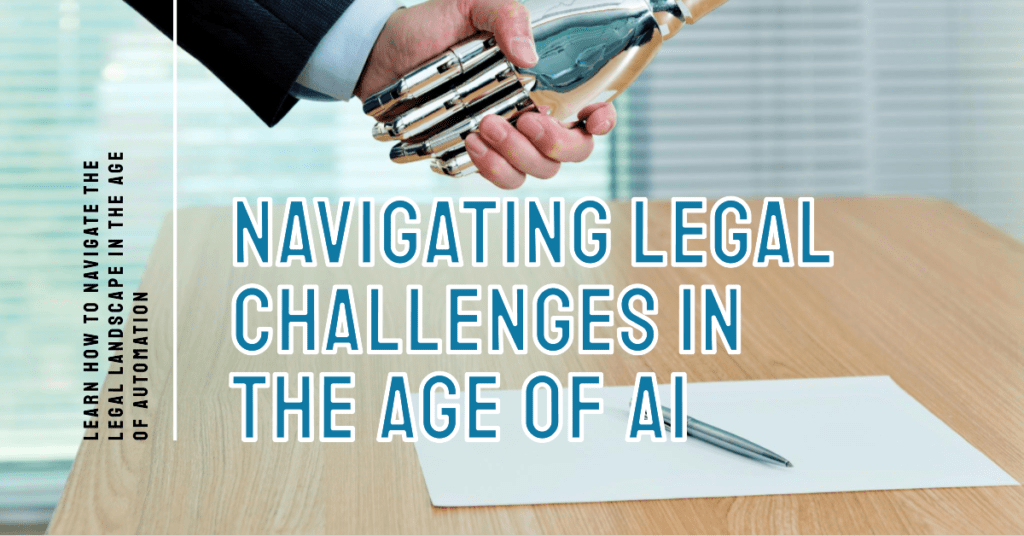In the ever-evolving landscape of technology, the rise of Artificial Intelligence (AI) and automation has transformed industries and societies. While these advancements offer unprecedented benefits, they also bring forth an array of legal challenges that demand careful consideration. As we delve into the intricate interplay between innovation and the law, we shed light on the legal complexities that arise in the age of AI and automation.
The Dawn of a New Era: AI and Automation
Artificial Intelligence and automation have revolutionized industries, introducing efficiencies and capabilities previously thought unattainable. From self-driving cars to predictive analytics, AI-powered technologies have the potential to reshape how we live, work, and interact. However, with these advancements come a host of legal issues that require novel solutions.
1. Intellectual Property and AI Creations
“As AI systems generate content, software, and other creative works, the question of intellectual property ownership becomes intricate. Determining whether AI-created works can be attributed to a human author or are the result of an automated process challenges conventional copyright laws. Navigating the rights and responsibilities surrounding AI-generated creations is a legal frontier yet to be fully charted.” Says Arnaud, CMO Assistant of LeanLaw
2. Accountability and Liability
“Automation can result in a diffusion of responsibility when errors occur. In cases of accidents involving self-driving cars or decisions made by AI-powered systems, establishing liability becomes complex. Defining the legal culpability of developers, manufacturers, and users in AI-related mishaps requires a reevaluation of traditional legal principles.” Says Harrison Jordan, from Substance Law
3. Data Privacy and Security
“AI thrives on data, and the vast volumes of information processed raise significant concerns regarding data privacy and security. As AI systems analyze personal data to make predictions and decisions, ensuring compliance with data protection regulations such as GDPR becomes paramount. Balancing the benefits of AI with individual privacy rights presents a challenge that demands legislative and regulatory attention.” Says Rene Delgado, Founder & CEO at The Indoor Golf Shop
4. Ethical Considerations
“AI algorithms often make decisions that impact individuals, raising ethical questions about fairness, bias, and transparency. The responsibility to ensure that AI technologies do not perpetuate discriminatory practices or favor specific groups requires new legal frameworks. The development of ethical guidelines that align with legal principles is imperative to prevent unintended consequences.” Says Harri Dhillon, Co-CEO at e-Careers
5. Labor and Employment Law
“Automation has the potential to reshape the job market, leading to concerns about job displacement and worker rights. Legal frameworks must adapt to address issues related to employee retraining, benefits, and the evolving nature of work in an AI-driven economy. Striking a balance between technological progress and safeguarding workers’ rights is a multifaceted challenge.” Says Jessica Shee from iBoysoft
6. Regulation and Adaptability
“The pace of AI and automation’s advancement often outpaces the development of regulatory frameworks. The challenge lies in creating laws that foster innovation while mitigating potential risks. Regulatory agility becomes essential to ensure that laws can adapt to the rapidly changing technological landscape.” Says Nick Edwards, Managing Director at Snowfinders.
Conclusion: Forging a Legal Path Forward
The marriage of AI and automation with legal principles is a complex endeavor that requires collaboration among legal experts, technologists, policymakers, and stakeholders. As these transformative technologies continue to shape our world, addressing the legal challenges they pose becomes an imperative. By cultivating a proactive and adaptable legal framework, we can harness the potential of AI and automation while safeguarding individual rights, societal values, and the rule of law.
